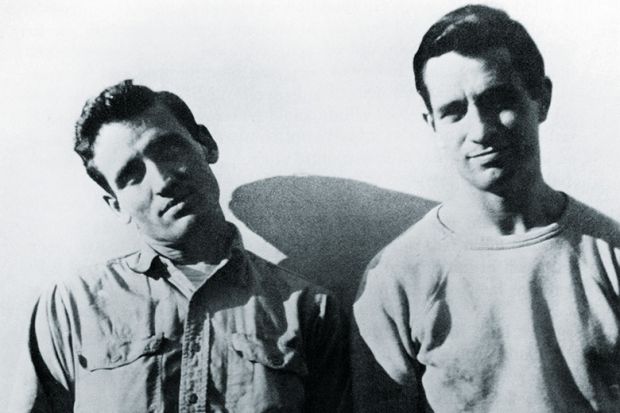Berkeley, 1989: I attended a lecture about Jack Kerouac, who in his novel On the Road (1957) drove “to evade zones of supervision”. A student raised his hand: “Professor, six years ago, I read On the Road in class; I dropped out, and travelled back and forth cross country…”
Does the Beat generation – its outsider lifestyle and literature – still provoke and inspire us today? Allen Ginsberg’s poem Howl boasts of being “expelled from the academies for crazy & publishing obscene odes on the windows of the skull”. But after six decades of mastication by scholars, have the Beats become, like a professor’s grey goatee and ponytail, relics of another era? As the Berkeley student concluded, “Now I’ve come back, and I can tell you, it was all shit.”
Two recent scholastic books may supply answers. The first is The Best Minds of My Generation: A Literary History of the Beats (2017), Ginsberg’s transcribed lectures from his “Jack Kerouac School of Disembodied Poetics” programme at Naropa University in Colorado. Here you get your Beat hagiography served straight up, with a chaser of Beat poetics and pedagogy, gossip about Jack and friends, Zen aphorisms and stoner wisdom.
A more grounded, well-researched study, making cooler judgements, is Steven Belletto’s The Beats. Here you can trace the roots of early 1950s Beat culture in New York and San Francisco; how the “big three” of William Burroughs, Kerouac and the whirling, ever-promotional Ginsberg devised, publicised and defended their breakthrough works; how the Establishment intelligentsia discredited them as slacker Beatniks; and how the Beat posture of Zen disengagement later joined the anti-war movement and tried to levitate the Pentagon.
Belletto, editor of The Cambridge Companion to the Beats (2017), is brimming with detail and anecdote. Extensively explored are the role of little magazines and mimeographs, bookshops and bars, legal battles and personal disputes; little-known poets and hangers-on; and the widening of Beat Lit as it engaged feminism, race issues, Squares and nitpicking New Critics, who disliked the “loose and undiscriminating” Beat poetics. For Belletto, the Beats are a coterie of writers venturing outside the dominant culture, finding new, appetitive ways of living – drink, drug, sex, all crazed and goofy, all ecstatic impulse – and then fashioning this material into wild myths about their lives and their legendary friends.
But a problem for this admirably comprehensive book is that much of Beat writing sounds dated and tinny. “Like man don’t flip, I’m hip you cooled/this scene” (Diane di Prima). Belletto calls these lines a self-reflexive performance of slang. We might also describe them as: not engaging; not groovy; not good. And Beat outsider art can depend – drearily – on insider references: Philip Whalen records himself drunk and “roaring, ‘Gone, everything gone’” to “The Messers. Ginsberg & Kerouac, also juiced”. Belletto avoids oft-told tales of bed and bongo: Burroughs killing his wife in what he initially claimed was a drunken William Tell game merits but one paragraph. Still, he might have addressed the Freudian puzzle: how did Kerouac’s living with his mother affect his “spontaneous prose”?
Ginsberg’s book believes the Beat party never ended; Belletto’s book offers a morning-after accounting of what the Beats said and did.
David Gewanter is professor of English at Georgetown University. His latest book of poems is Fort Necessity (2018).
The Beats: A Literary History
By Steven Belletto
Cambridge University Press, 476pp, £26.99
ISBN 9781316817179
Published 11 March 2020
POSTSCRIPT:
Print headline: Morning after a night on the road
Register to continue
Why register?
- Registration is free and only takes a moment
- Once registered, you can read 3 articles a month
- Sign up for our newsletter
Subscribe
Or subscribe for unlimited access to:
- Unlimited access to news, views, insights & reviews
- Digital editions
- Digital access to THE’s university and college rankings analysis
Already registered or a current subscriber? Login







